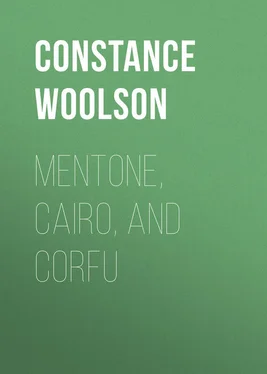Constance Woolson - Mentone, Cairo, and Corfu
Здесь есть возможность читать онлайн «Constance Woolson - Mentone, Cairo, and Corfu» — ознакомительный отрывок электронной книги совершенно бесплатно, а после прочтения отрывка купить полную версию. В некоторых случаях можно слушать аудио, скачать через торрент в формате fb2 и присутствует краткое содержание. ISBN: , Жанр: foreign_prose, на английском языке. Описание произведения, (предисловие) а так же отзывы посетителей доступны на портале библиотеки ЛибКат.
- Название:Mentone, Cairo, and Corfu
- Автор:
- Жанр:
- Год:неизвестен
- ISBN:http://www.gutenberg.org/ebooks/33367
- Рейтинг книги:4 / 5. Голосов: 1
-
Избранное:Добавить в избранное
- Отзывы:
-
Ваша оценка:
- 80
- 1
- 2
- 3
- 4
- 5
Mentone, Cairo, and Corfu: краткое содержание, описание и аннотация
Предлагаем к чтению аннотацию, описание, краткое содержание или предисловие (зависит от того, что написал сам автор книги «Mentone, Cairo, and Corfu»). Если вы не нашли необходимую информацию о книге — напишите в комментариях, мы постараемся отыскать её.
Mentone, Cairo, and Corfu — читать онлайн ознакомительный отрывок
Ниже представлен текст книги, разбитый по страницам. Система сохранения места последней прочитанной страницы, позволяет с удобством читать онлайн бесплатно книгу «Mentone, Cairo, and Corfu», без необходимости каждый раз заново искать на чём Вы остановились. Поставьте закладку, и сможете в любой момент перейти на страницу, на которой закончили чтение.
Интервал:
Закладка:
The Professor had not remained to hear the legend; he had gone up the mountain, and we now heard him shouting; that is, he was trying to shout, although he produced only a sort of long, thin hoot.
"What can that be?" I said, startled.
"It is the Professor," answered Mrs. Trescott. "It is his way of calling. He has his own methods of doing everything."
It turned out that he had found a path down which the lemon girls were coming from the terraces above. We went up to this point to see them pass. They were all strong and ruddy, and walked with wonderful erectness, balancing the immense weight of fruit on their heads without apparent effort; they were barefooted, and moved with a solid, broad step down the steep, stony road. The load of fruit for each one was one hundred and twenty pounds; they worked all day in this manner, and earned about thirty cents each! But they looked robust and cheerful, and some of them smiled at us under their great baskets as they passed.
One afternoon not long after this we went to the Capuchin monastery of the Annunziata. Some of us were on donkeys and some on foot, forming one of those processions so often seen winding through the streets of the little Mediterranean town. We passed the shops filled with the Mentone swallow, singing his "Je reviendrai" upon articles in wood, in glass, mosaic, silver, straw, canvas, china, and even letter-paper, with continuous perseverance; we passed the venders of hot chestnuts, which we not infrequently bought and ate ourselves. Then we came to the perfume distilleries, where thousands of violets yield their sweetness daily.
"They cultivate them for the purpose, you know," said Verney. "It's a poetical sort of agriculture, isn't it? Imagination can hardly go further, I think, than the idea of a violet farm."
We passed small chapels with their ever-burning lamps; the new villas described by the French newspapers as "ravishing constructions"; and then, turning from the road, we ascended a narrow path which wound upward, its progress marked here and there by stone shrines, some freshly repainted, others empty and ruined, pointing the way to the holy church of the Annunziata.
"The only way to appreciate Mentone is to take these excursions up the valleys and mountains," said Mrs. Clary. "Those who confine themselves to sitting in the gardens of the hotels or strolling along the Promenade du Midi have no more idea of its real beauty than a man born blind has of a painting. Descriptions are nothing; one must see . I think the mountain excursions may be called the shibboleth of Mentone; if you do not know them, you are no true Israelite."
Verney had a graceful way of gathering delicate little sprays and blossoms here and there and silently giving them to Janet. The Professor had noticed this, and to-day emulated him by gathering a bunch of mallow with great care – a bunch nearly a yard in circumference – which he presented to Janet with much ceremony.
"Oh, thanks; I am so fond of flowers!" responded that young person. "Is it asphodel? I long to see asphodel."
Now asphodel was said to grow in that neighborhood, and Janet knew it; by expressing a wish to see the classic blossom she sent the poor Professor on a long search for it, climbing up and down and over the rocks, until I, looking on from my safe donkey's back, felt tired for him. And it was not long before our donkeys' steady pace left him far behind.
"With its pale, dusty leaves and weakly lavender flowers, it is, I think, about as depressing a flower as I have seen," said Inness, looking at the mammoth bouquet.
"I might fasten it to the saddle, and relieve your hands, Miss Trescott," suggested Verney. So the delicate gray gloves relinquished the pound of mallow, which was tied to the saddle, and there hung ignominiously all the remainder of the day.
The church and convent of L'Annunziata crown an isolated vine-clad hill between two of the lovely valleys behind Mentone. The church was at the end of a little plaza, surrounded by a stone-wall; in front there was an opening towards the south, where stood an iron cross twenty feet high, visible, owing to its situation, for many a mile. The stone monastery was on one side; and the whole looked like a little fortification on the point of the hill. We went into the church, and looked at the primitive ex-votos on the wall, principally the offerings of Mediterranean sailors in remembrance of escape from shipwreck – fragments of rope and chain, pictures of storms at sea, and little wooden models of ships. In addition to these marine souvenirs, there were also some tokens of events on dry land, generally pictures of run-aways, where such remarkable angels were represented sitting unexpectedly but calmly on the tops of trees by the road-side that it was no wonder the horses ran. But the lovely view of sea and shore at the foot of the great cross in the sunshine was better than the dark, musty little church, and we soon went out and seated ourselves on the edge of the wall to look at it. While we were there one of the Capuchins, clad in his long brown gown, came out, crossed the plaza, gazed at us slowly, and then with equal slowness stooped and kissed the base of the cross, and returned, giving us another long gaze as he passed.
"Was that piety or curiosity?" I said.
"I think it was Miss Trescott," said Baker.
Now as Miss Elaine was present, this was a little cruel;
but I learned afterwards that Baker had been rendered violent that day by hearing that his American politeness regarding Miss Elaine's self-bestowed society had been construed by that young lady into a hidden attachment to herself – an attachment which she "deeply regretted," but could not "prevent." She had confided this to several persons, who kept the secret in that strict way in which such secrets are usually kept. Indeed, with all the strictness, it was quite remarkable that Baker heard it. But not remarkable that he writhed under it. However, his remarks and manners made no difference to Miss Elaine; she attributed them to despair.
While we were sitting on the wall the Professor came toiling up the hill; but he had not found the asphodel. However, when Janet had given him a few of her pretty phrases he revived, and told us that the plaza was the site of an ancient village called Podium-Pinum, and that the Lascaris once had a château there.
"The same Lascaris who lived in the old castle at Mentone?" said Janet.
"The same."
"These old monks have plenty of wine, I suppose," said Inness, looking at the vine terraces which covered the sunny hill-side.
"Very good wine was formerly made around Mentone," said the Professor; "but the vines were destroyed by a disease, and the peasants thought it the act of Providence, and for some time gave up the culture. But lately they have replanted them, and wine is now again produced which, I am told, is quite palatable."
"That is but a cold phrase to apply to the bon petit vin blanc of Sant' Agnese, for instance," said Verney, smiling.
Soon we started homeward. While we were winding down the narrow path, we met a Capuchin coming up, with his bag on his back; he was an old man with bent shoulders and a meek, dull face, to whom the task of patient daily begging would not be more of a burden than any other labor. But when we reached the narrow main street, and found a momentary block, another Capuchin happened to stand near us who gave me a very different impression. Among the carriages was a phaeton, with silken canopy, fine horses, and a driver in livery; upon the cushioned seat lounged a young man, one of Fortune's favorites and Nature's curled darlings, a little stout from excess of comfort, perhaps, but noticeably handsome and noticeably haughty – probably a Russian nobleman. The monk who stood near us with his bag of broken bread and meat over his back was of the same age, and equally handsome, as far as the coloring and outline bestowed by nature could go. His dark eyes were fixed immovably upon the occupant of the phaeton, and I wondered if he was noting the difference; it seemed as if he must be noting it. It was a striking tableau of life's utmost riches and utmost poverty.
Читать дальшеИнтервал:
Закладка:
Похожие книги на «Mentone, Cairo, and Corfu»
Представляем Вашему вниманию похожие книги на «Mentone, Cairo, and Corfu» списком для выбора. Мы отобрали схожую по названию и смыслу литературу в надежде предоставить читателям больше вариантов отыскать новые, интересные, ещё непрочитанные произведения.
Обсуждение, отзывы о книге «Mentone, Cairo, and Corfu» и просто собственные мнения читателей. Оставьте ваши комментарии, напишите, что Вы думаете о произведении, его смысле или главных героях. Укажите что конкретно понравилось, а что нет, и почему Вы так считаете.












